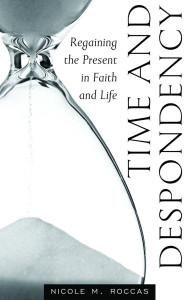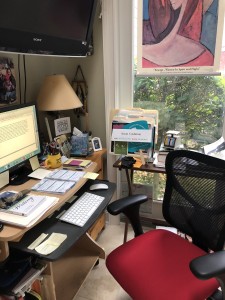 Following up on last Monday’s post, “#Lent2018: To Re-spond or De-spond?”… this week I’m continuing my reading in Nicole Roccas’ book Time and Despondency: Regaining the Present in Faith and Life, and also working with the Lenten reading guide she developed to go with the book.
Following up on last Monday’s post, “#Lent2018: To Re-spond or De-spond?”… this week I’m continuing my reading in Nicole Roccas’ book Time and Despondency: Regaining the Present in Faith and Life, and also working with the Lenten reading guide she developed to go with the book.
In Week 1, Roccas encouraged us to find ways to exercise humility. In her “stepping stones for the journey” at the end of the selection, she asked the reader, “What is one way you’d like to try exercising humility this week, based on the readings?” My answer was, “by being honest with myself and others when I fail, especially in the areas of fasting and disordered eating.” I had the opportunity to confess a big fall this weekend, when my husband returned home from a trip around midnight Saturday night and I had experienced an eating binge and purge. But instead of hiding it and letting the failure and secret cause me to despond, I responded to God’s love and forgiveness by confessing it and forgiving myself. As a result, I was able to move on without despairing.
In Week 2, Roccas asks us to read sections of Chapter 2 and 3, as well as a section of Chapter 7, “Patience and Perseverance.” Here are two nuggets from that section that spoke to me:
Patience is a direct counterattack against the restlessness of despondency, which hastens us to the next task before we’ve completed what we started…. We have to be patient with despondency itself. Our first instinct, when the heavy stone of apathy settles in our stomach, is to drop what we’re doing and “fix” whatever has broken with us—we’ll stop folding the laundry or working and seek out the newest blog post, prayer, or experience that will put an end to the feelings we are having.

I’ve experienced that so many times, especially recently while working on the first draft of a new book, a task that is extremely difficult and sometimes tedious for me. Saturday afternoon I had spent just over an hour on this draft when the restlessness hit me. It was just such hard work, and there were much more fun things available—especially binge-watching Netflix and binge-eating, two activities which seem to feed off each other at times.
Because the second week of Lent includes the commemoration of Saint Gregory of Palamas, Roccas included a quote from his Treatise on the Spiritual Life in this section of the study guide. Here’s part of that quote:
A human being who does not endure courageously the unpleasant burdens of temptations will never produce fruit worthy of the divine winepress and eternal harvest….
Keeping my butt in the chair and my hands on the keyboard to continue drafting the new book was, at that juncture, my best defense against the “unpleasant burdens of temptations” (Netflix and food binges), but I caved. How could I have won that battle, and what can I do differently next time, because there will definitely be many next times?
Roccas addresses this in her section on “Stepping Stones of Patience”:

Get to know your cell(s). She is referring to the small space occupied by monks and nuns who live in monasteries, for the lay person, a cell can be a place where we work, live, serve others, etc. As Roccas says:
What is your cell, the space in your life you are responsible to occupy? You probably have many of them, according to different commitments or times of day: the work cell, the cleaning cell, the writing cell, the evening commute cell.
For me, the work cell is the same as the writing cell. And it’s where I should have stayed when I ditched it for the TV and food binge Saturday afternoon and evening. How could I have found the strength to stay put?
Stay put . . . for two minutes. When you feel like fleeing your respective cell, agree to stay put for a short period of time—two, five, or ten minutes to start with…. Say to yourself, “I will keep working on the current task for ten minutes and then check my email,”…. What we’re trying to combat is the impulsivity and mindlessness that bully us into despondent idleness.

I experience this same impulsivity when I’m on the elliptical, which faces a big screen TV in my office. My goal is to work out for 20-30 minutes. I turn on a one-hour TV show that I’ve recorded, so that works out to be 40 minutes of viewing without the commercials. I get on the machine and start exercising and watching. But often I don’t even make it to 20 minutes until I’m bored and stop exercising, walk the few feet over to my comfy yellow chair, sit down and continue watching the show without exercising! I feel like Roccas has given me a weapon against this idleness that I can use both while writing and exercising. If I can talk myself into working for two more minutes, or five, or ten, maybe that will breed encouragement and I’ll work even longer. I tried this on Sunday afternoon and it really helped. (P.S. Last week I started working out with a personal trainer at a gym near our house two days a week on the weight machines. At least this part of my exercise routine isn’t self-directed!)
The third thing Roccas says in this section is:
Do more things that require patience…. Read a section of a book, poem, or psalm aloud, slowly, not letting yourself skip over any of the words. Alternately take a walk but move at a snail’s pace or just stand still and look around.
My version of this activity today was to sit in my other comfy chair (in the living room) and slowly read aloud a passage from Hebrews that Roccas quotes at the top of this page of her study guide. And then I just sat there quietly for about five to ten minutes, which is a lot longer than it sounds when you’re not doing anything—not reading, not sleeping, not watching TV. Try it and you’ll see.
So, for her “Stepping Stones for the Journey” question at the end of this week’s study guide, Roccas asks the reader:
What is one way you’d like to try exercising patience this week, based on the readings?
My answer:
I will try to keep working on my new book for a few minutes longer before stopping to get online or doing something else that’s easier and more fun. And I will try to keep working out on the elliptical for a few minutes longer before getting off to sit in my chair and watch TV. By God’s grace.
Thanks, always, for reading. Stay tuned as the Lenten journey continues, and please leave a comment here or on my Facebook thread.